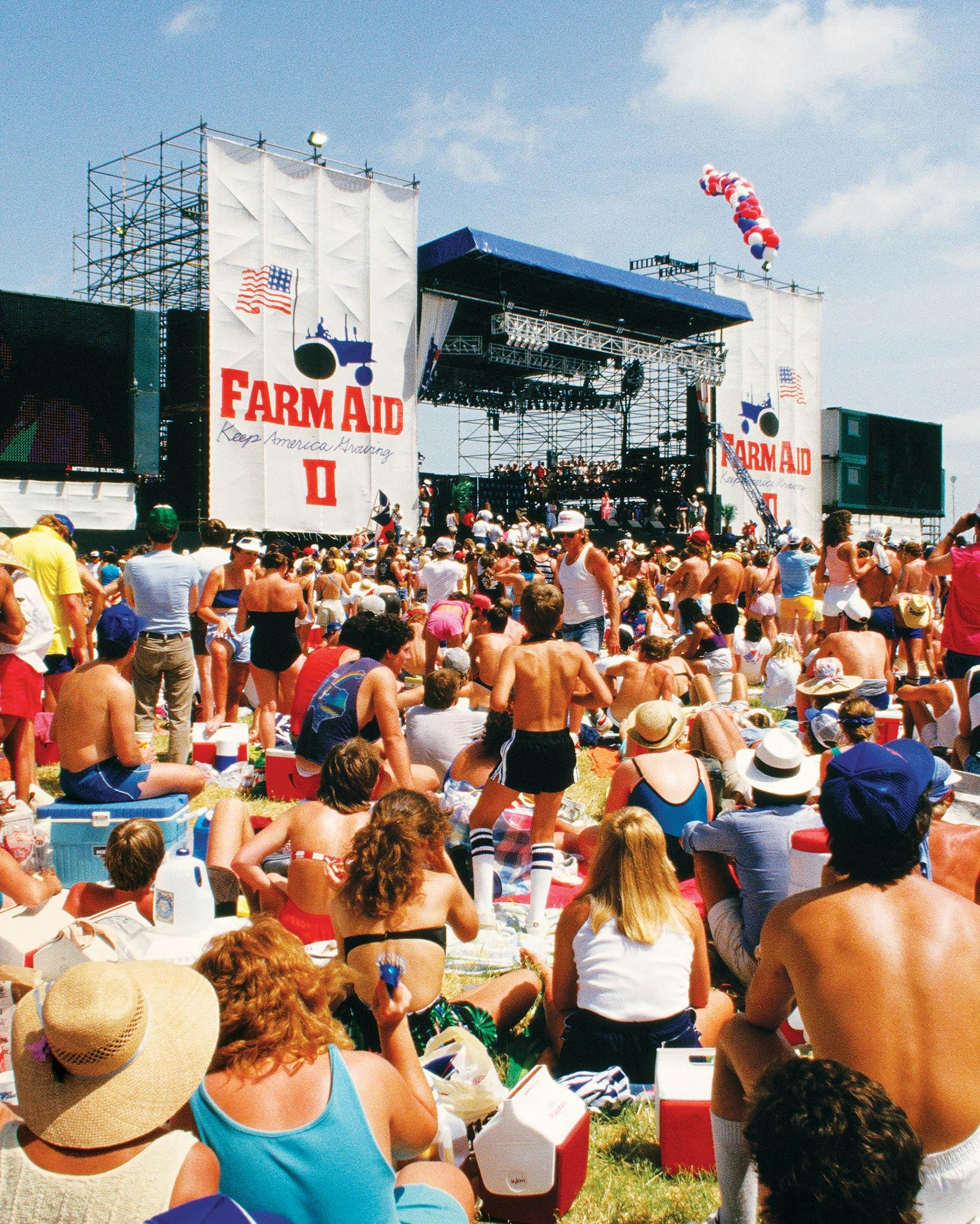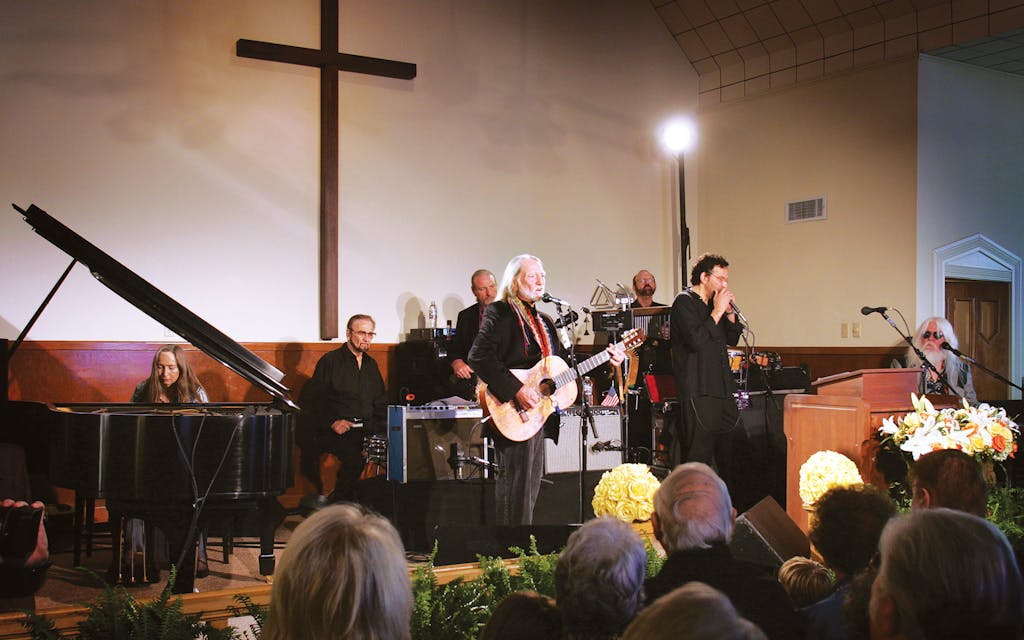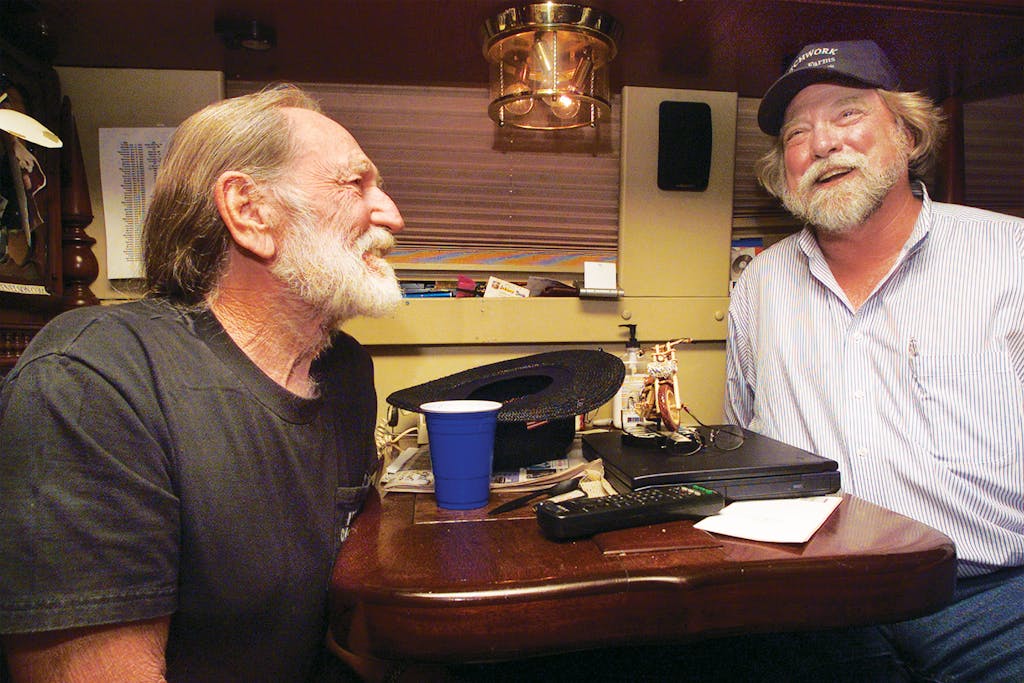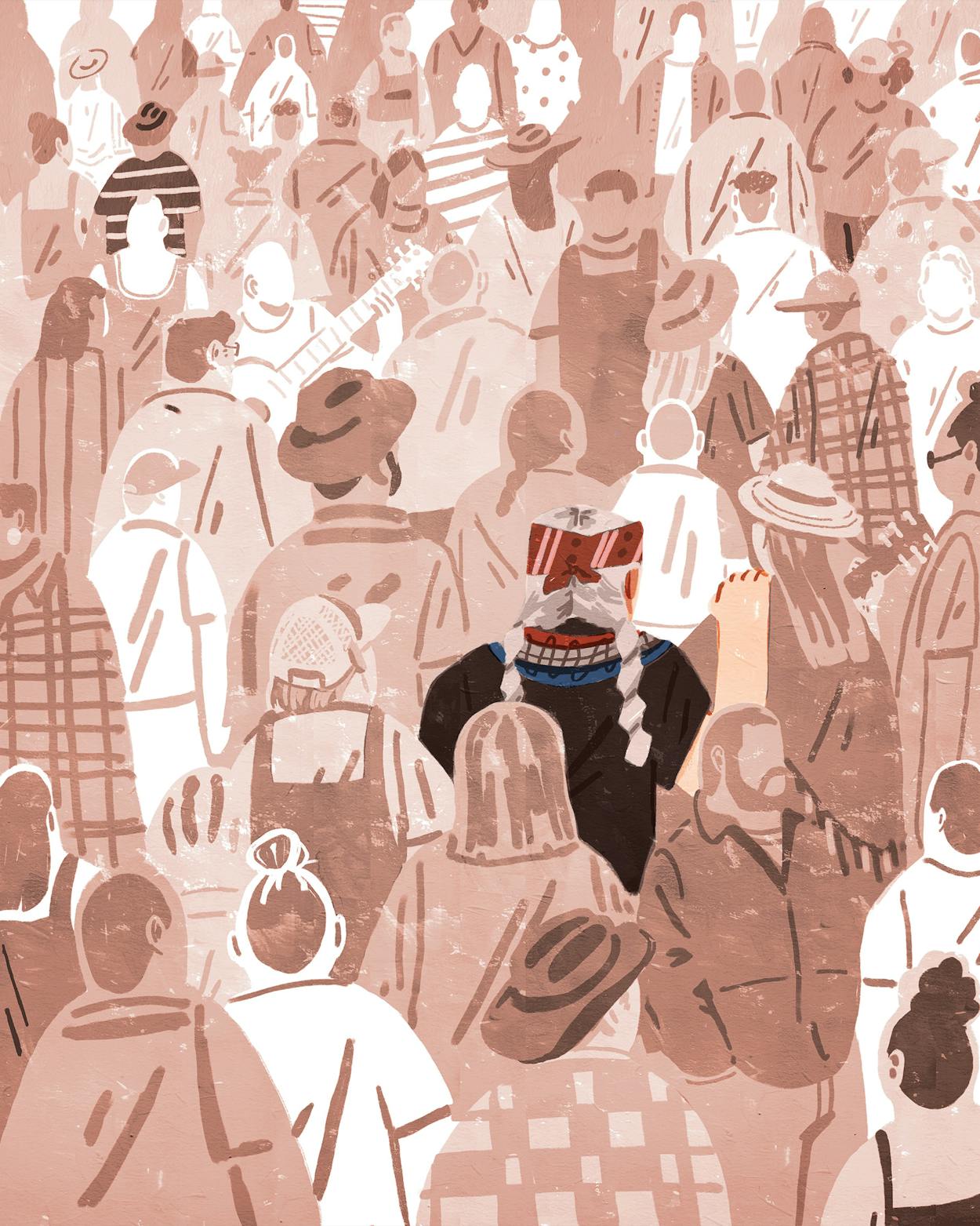“The farm killed me.”
An Iowa farmer’s 1985 suicide note bluntly told the story of that decade’s agricultural crisis. Family farms were disappearing at an alarming pace, taken down by bank foreclosures and bankruptcy.
The suicide rate among farmers soared. And Willie Nelson, a son of rural North Texas who knew firsthand how tough farming could be, even in good times, wanted to help.
Bob Dylan was the instigator: at the July 13, 1985, Live Aid concert for Africa, held in Philadelphia, he declared, “The American family farmer could use a hand too.” Though, given the event’s global focus, some balked at Dylan’s comment as overly nationalistic, Willie took him seriously. “I asked some of my friends around who were ranchers and farmers [in Texas], and they said, ‘Well, it’s really bad in the Midwest . . . It’s on the way [here].’ ” Farmers’ dire straits—caused by a combination of sinking crop prices and federal farm policy that urged farmers to overextend themselves—“pissed me off,” said Willie.
So he decided to do something about it. In short order, he put together a team of activists, started a nonprofit, and—a mere two months after Dylan had planted the idea in his head—wrangled dozens of artists for the first Farm Aid concert, held on September 22, 1985, at the University of Illinois at Urbana-Champaign. Some 78,000 people cheered 54 acts, including Willie, Neil Young, John Mellencamp, Johnny Cash, Dylan, B. B. King, Lou Reed, and Loretta Lynn. Farmers and activists also took the stage during the twelve-hour event, which raised $7 million.

Over the 35 years since, Farm Aid has continued to work on behalf of family farms. More than five hundred artists have played the annual festival, raising close to $60 million. The Massachusetts-based nonprofit isn’t just about that one big event, though; it operates an emergency hotline, provides disaster relief, and gives annual grants to farmers and farm assistance programs.
“Willie is the DNA of Farm Aid,” says its executive director, Carolyn Mugar. “It’s no telling how many farmers have stayed on the land because he listened to them and gave them the strength to continue.” One such farmer, 85-year-old Nebraskan Merle Hansen, said in 2005 that Willie and Farm Aid “have stuck with us over the long haul. You are good folks to ride the river with.”
“Farmers were losing their land and being shoved off,” Roger Allison recalls. “Then Willie Nelson says he is going to help. . . . We felt we could see the light at the end of the tunnel.”
Willie first rode the river growing up dirt poor in Abbott, a small town about 25 miles north of Waco, where, as a young child, he picked cotton and baled hay. On Sundays he learned the Golden Rule at the Abbott Methodist Church. Gene Autry, the white-hatted singing cowboy, became his role model, vanquishing evil with his guitar every Saturday afternoon at the Ritz picture show. In Abbott, when people needed help, you gave them a hand. Farmers chipped in to buy Willie a $60 calf when he joined Future Farmers of America in high school. As a guitarist for Bud Fletcher and the Texans, an adolescent Willie attracted his first fan club—local teenage girls and young women who bought him a fancy Western suit to wear onstage. Willie saw these gifts not as acts of charity but as what we now call “paying it forward.”
That kind of thinking would become the Willie way. During his early years as a journeyman musician, dozens of helping hands gave him a boost, and he never forgot the generosity that kept him going. For the past fifty years, he’s lent his support to hundreds of causes. As far back as 1973, he organized a “homecoming” event assisting Abbott’s parent-teacher association. That was the first of numerous fundraisers he’s held for the folks in Hill County. Seven years ago he gave $120,000—most of it proceeds from an Austin concert—to residents after a fertilizer plant exploded in West, killing 15 people and injuring more than 250. In 2006 he purchased the Abbott Methodist Church, likely saving it from the wrecking ball.

Many such efforts went under the radar, as when he played a concert in the Big Bend in 1980 to raise money for the local hospital. Others got more media attention: in 2004, when Texas Monthly staffer Michael Hall sought to raise money for victims of the Indian Ocean tsunami, the first person he called was Willie. “Let’s do it,” Willie told Hall, who noted that “with Willie driving the bus, others hopped on.” The star-studded Austin concert eventually raised over $130,000. In 2011, Willie co-headlined, with George Strait and the Dixie Chicks, another Austin benefit that yielded more than half a million dollars for victims of wildfires in Central Texas. The list goes on and on. Willie, it sometimes seems, can’t say no.
Some of his charitable work has raised controversy, costing him more than time and money. For decades Willie has been an advisory board member of the National Organization for the Reform of Marijuana Laws, though his reputation as an outspoken cannabis enthusiast has never gone over well with the conservative faction of his audience. According to Joe Nick Patoski’s 2008 biography of Willie, some locals boycotted his 2006 induction into the Hill County Hall of Fame because they disapproved of his “lifestyle,” and the University of Texas at Austin once barred him from performing at a Special Olympics ceremony because he might attract “undesirables” to a family event. But he just keeps on smoking. This past April 20 he hosted a four-hour-and-twenty-minute “Come and Toke It” livestream, encouraging socially isolated viewers to “smoke one with Willie” and soliciting donations for the Last Prisoner Project, which works to release inmates incarcerated on minor drug charges. While Willie told jokes, sang songs, and cheered guests, thousands of online viewers responded with donations and comments like “You’re a fighter for this plant!”
Willie’s most contentious act of charity was playing a 1987 benefit concert for the imprisoned American Indian activist Leonard Peltier, who was convicted of the murder of two FBI agents. Peltier’s supporters, who believed he was framed, sought a new trial. “[Willie] took more heat than anyone did,” Kris Kristofferson said. Police officers, angered by his participation, picketed Willie concerts in West Virginia and Rhode Island the following year. As a peace offering, Willie shared the proceeds from a Massachusetts concert with a police memorial fund—and the American Indian Movement. He also made hefty donations to several police organizations. Around the same time, Baylor University canceled a fundraiser Willie had organized to help the residents of nearby Leroy, who’d lost their life savings when a local bank failed. Texas Rangers had threatened to picket the concert, and the university president said that Willie should use his influence to “strengthen the moral fiber of our nation.” (Willie simply relocated the show to another Waco venue.)

But Willie has always followed his own moral compass. As far back as 1966, when his Willie Nelson Show package tour stormed across South Texas and Louisiana, he added the young black country artist Charley Pride to the bill. At Dewey Groom’s segregated Longhorn Ballroom, in Dallas, “Dewey didn’t want Charley on the bandstand,” Willie later recalled. “So I got up onstage and introduced Charley . . . I laid a big kiss on him, right on the mouth. Then he started singing, and they loved it.” The color barrier was broken; in fact, later that night, after a rowdy guitar pull in his motel room, Willie “wished I would’ve had a camera. Charley Pride and Dewey Groom had both passed out on the same bed.”
Well out of the public eye, Willie has provided a haven to friends who have hit rock bottom. For decades, his golf course at Pedernales has served “as Willie’s own Betty Ford clinic for those who needed to clean up from drugs or alcohol,” according to Patoski. “The golf course kept everyone out of the bars and out of trouble,” Asleep at the Wheel’s Ray Benson told Patoski. “Dennis Hopper got straight by coming to Pedernales . . . It was a form of rehab.”
Singer-songwriter Waylon Payne credits Willie with saving his life, not to mention his career. The son of the late Nelson Family Band guitarist Jody Payne and country singer Sammi Smith, who split up soon after his birth, Payne first met Willie when he was a child. Payne was raised by strict relatives in Vidor and became homeless at 18, after he came out as gay. As he immersed himself in the music scene, he started using speed, which eventually turned into a decade-long crystal meth addiction. Twelve years ago, at age 36, struggling to get clean, he landed at Pedernales. “Willie and his family rallied around me,” Payne said recently, on the eve of his first album release in seventeen years. “He showed me that my situation could change. He gave me the advice I now live by: ‘You can do nothing about yesterday; you can do nothing about tomorrow. All you can do is make the best of right now. If you handle your now, then everything else will fall into place.’ ”

Missouri farmer Roger Allison says that Willie saved his life too. When they met in 1985, at that first Farm Aid, his and his parents’ farms were in foreclosure. Even today, he tears up remembering those dark days. “Farmers were losing their land and being shoved off, and farmers who were raising the food couldn’t even afford to feed themselves,” he recalls. “Then Willie Nelson says he is going to help—you’ve got the number one country singer in America standing up for family farmers. We had a champion on our side. It was so powerful and uplifting, and we felt we could see the light at the end of the tunnel.”
That year, Allison founded the activist group Missouri Rural Crisis Center, which filed appeals in federal courts, became part of a class-action suit, and reversed numerous foreclosures. The MRCC “is a classic example of why Farm Aid came into existence: to keep big corporate farms from running over the little people,” Willie said. Since 1985, the nonprofit has applied for and received a grant annually from Farm Aid; Willie signs every check.
Willie, wearing blue jeans, an Abbott Panthers tractor cap, and a T-shirt emblazoned with the phrase “100% Cotton,” testified before the Senate Agriculture Committee in 1985 that “the farmers in this country . . . are dropping like flies.” A push by activists for a bill that would allow farmers to restructure and pay off their debt without losing their land resulted in the Agricultural Credit Act of 1987. It was “the most progressive credit legislation for farmers since the New Deal,” Allison says. “It didn’t cost the taxpayer one red cent, and it kept farmers on the land.”
Allison’s wife, Rhonda Perry, is a fifth-generation farmer who cofounded the cooperative Patchwork Family Farms, which is currently operating emergency food programs for twenty Missouri counties hit hard by the coronavirus pandemic. “Willie’s background enabled him to know from the beginning that the world will be better with more family farmers producing our food and being part of our communities and economy rather than a handful of corporations controlling it,” she says. “Here we sit in our 1906 farmhouse because Willie Nelson and Farm Aid came into the picture and helped thousands of farmers like us to stay on our land by bringing attention to the situation.”


Three decades after he first started fighting for farmers, Willie hasn’t given up. On April 11 he and fellow Farm Aid board members Neil Young, John Mellencamp, and Dave Matthews performed a livestream concert, soliciting donations for the organization. And unless the coronavirus scuttles plans, the annual Farm Aid concert will happen in the fall, as it has nearly every year since 1985.
“Why have I played Farm Aid?” asks Dwight Yoakam, who has performed at the event several times. “Because Willie asked, period. Willie is Gandhi-like, and if Willie decided that it was his cross to bear, the least I could do was hold one end of it for him.”
Mellencamp agrees. “Willie’s tenacity and belief and vision is what keeps Farm Aid going,” he says. “He’s the driving force behind this.” About a decade ago, Mellencamp and thousands of fans started a social media campaign for Willie to receive the Nobel Peace Prize.
When he was asked about it at a Farm Aid press conference, Willie, being Willie, made light of his lifelong commitment to paying it forward. “What?” he asked. “You mean the No Bull Peace Prize?”
Holly George-Warren is the author of sixteen books, including, most recently, Janis: Her Life and Music.
- More About:
- Music
- Willie Nelson







